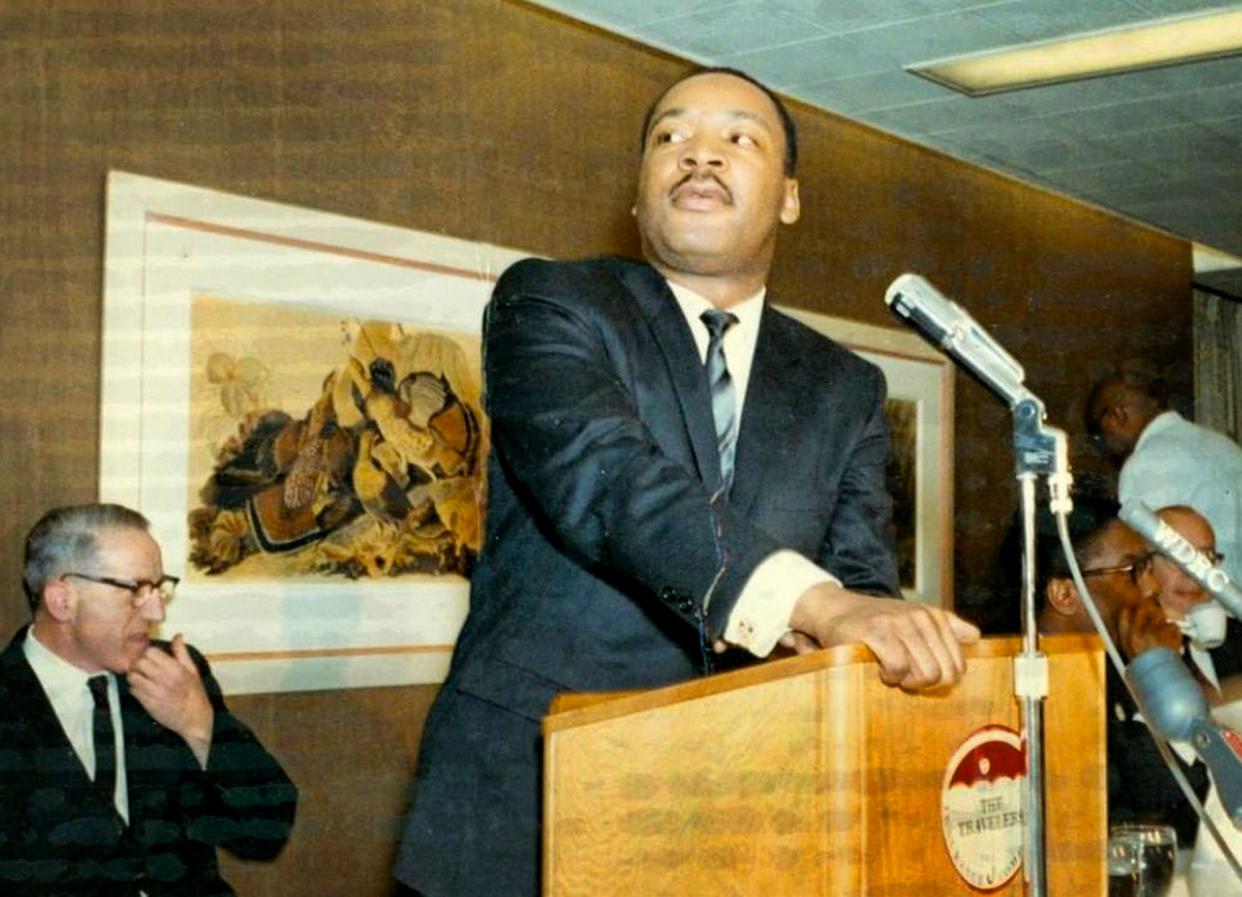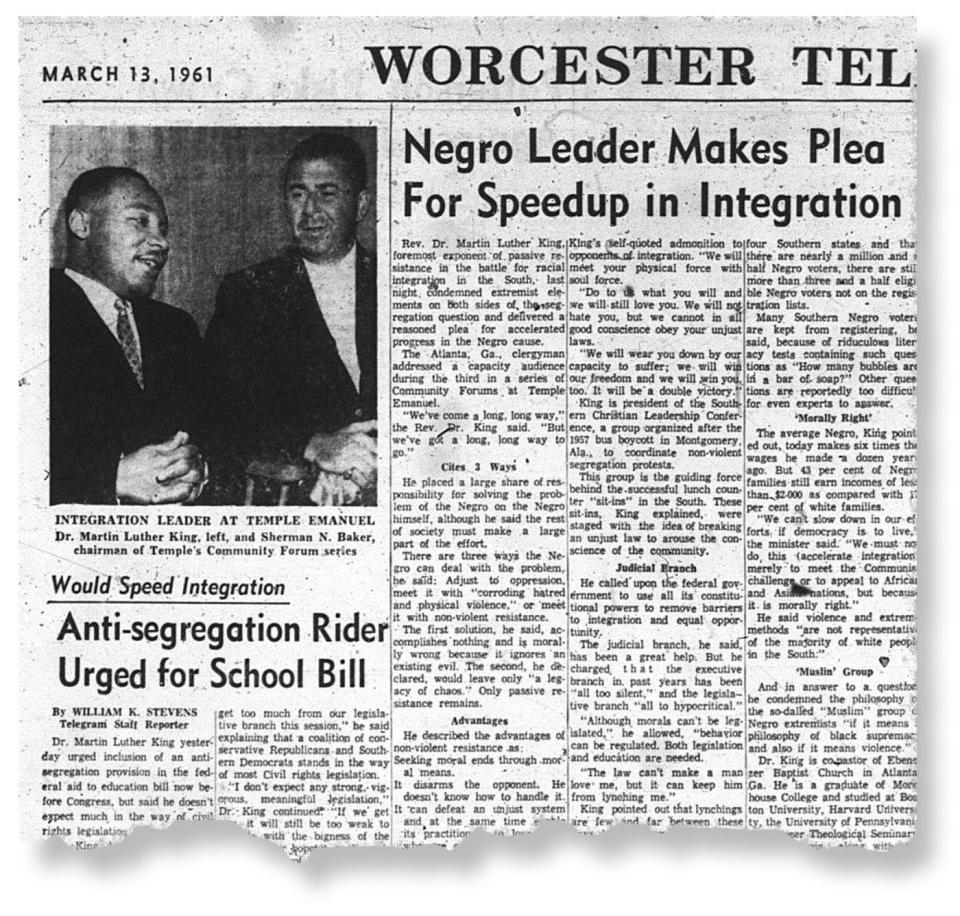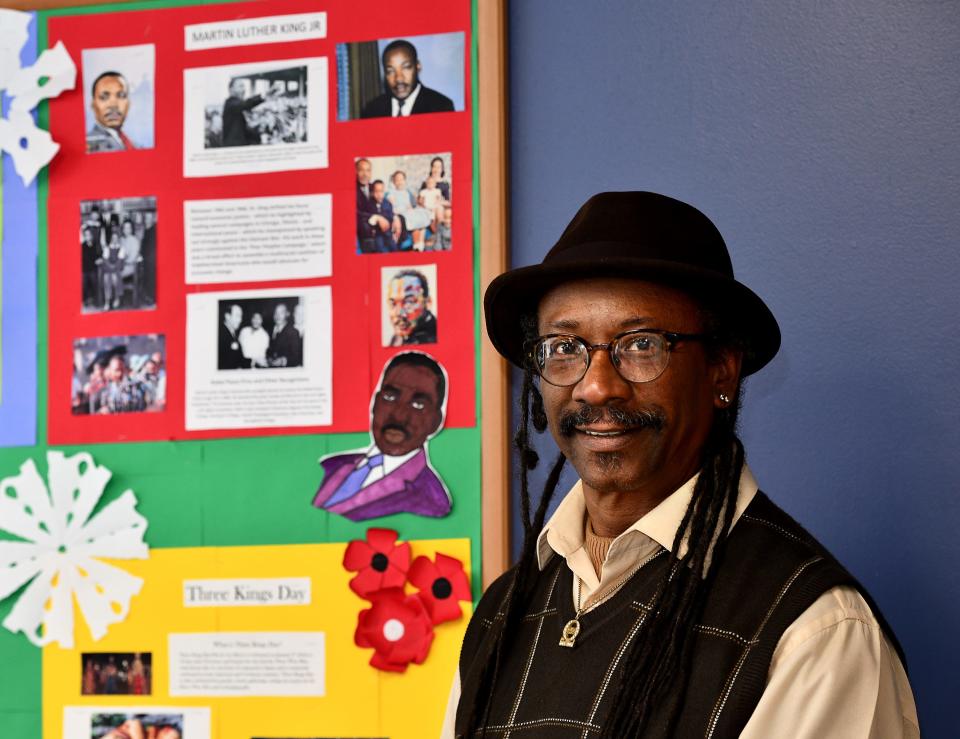Worcester's Black community leaders share thoughts on legacy of Martin Luther King Jr.

- Oops!Something went wrong.Please try again later.
WORCESTER - With Martin Luther King Day on Monday, leaders in Worcester’s Black community shared their thoughts reflecting on what both the day and King’s message meant to them personally as well as the city.
King visited and spoke in Worcester in 1961 at Temple Emanuel when he was invited by Rabbi Joseph Klein. On Monday, the MLK Jr. Community Breakfast will take place at Assumption University's Plourde Recreation Center.

Fred Taylor, president of Worcester NAACP
“He made a lot of sacrifices to make the changes that we are reaping the benefits of today,” said Fred Taylor. “A lot of systems have been changed because of his advocacy.”
Taylor said that while King is universally considered a hero of the civil rights movement now, “in his time he was a hero to some but not to everyone.” Growing up, Taylor remembers King as a hero to the Black community first and foremost and how his work made him enemies among those who wanted to maintain the status quo.
“He wasn’t always liked,” he said. “Anytime you rabble-rouse or get into good trouble, there is going to be a faction who tries to discredit you or find something wrong with you.”
For Worcester to better embody King’s message, Taylor hopes to see more inclusivity in the running of the city. “We have the first Hispanic city manager so for that we’ve come a long way but we still have a long way to go and have actually slid back a little bit. We lost a Black city councilor this year, now we only have one.”
More: MLK Jr. to be recognized with breakfast events at Assumption and Worcester State
Vincent Rougeau, president of College of the Holy Cross
As the first Black president of the College of the Holy Cross, Vincent Rougeau is an example of what King fought for in and of himself.
“It’s always a reminder of the incredible power of the civil rights movement in transforming this country through nonviolent peaceful protest and collective action across all kinds of communities,” he said.
Rougeau will be the keynote speaker at the Martin Luther King Jr. breakfast on Monday. “It will be an opportunity for me as the president of Holy Cross to share what the movement has meant for me and my family but also to join with people from around the community in celebrating the multicultural aspects of the city.”
That diversity is the city’s greatest strength, said Rougeau. “Our strength comes from our ability to work together and bring everyone along so all people can take advantage of these opportunities and in doing so make the future of Worcester even brighter.”
More: Holiday reminders: What's open, closed on MLK Day
Rob Jones, chief empowerment officer of T. Lee Associates
Rob Jones has a very personal connection to King’s teaching, particularly what’s become known as the philosophy of Kingian nonviolence, which focuses on nonviolent conflict resolution, and has devoted much of his life to spreading that message.
“When I think of Dr. King, I think of the legacy that he left us through Kingian nonviolence,” said Jones. “The goal is to win over people to live nonviolently, not win them over.”

Jones’ mentor, Dr. Bernard Lafayette, head of the Southern Christian Leadership Conference, worked closely with King, participating in the Freedom Rides and other major protests of the civil rights movement. Lafayette was instrumental in codifying and institutionalizing Kingian nonviolence.
“It’s a way to live your life with the goal to see the humanity in every person and you can look at every person as a possible ally,” said Jones. The primary goal is to address the triple evils King identified — war, poverty and racism — and “you can’t end racism without ending all of the other -isms.”
The last two are something that Worcester is always battling with. “(Kingian nonviolence) has been used and will continue to be used as a way to unify folks to understand that we need to stop devolving back into tribalism,” said Jones. “Everyone is looking out for their own community or membership group but the moment that we start pooling our resources together, we start doing things that can benefit all of us. Doing that, we’d be in a much better place and we are on that road.”
Listen: In 1961, Rev. Martin Luther King Jr. spoke about civil rights at Worcester temple
Johanna Hampton-Dance, community organizer and former city councilor-at-large candidate
Johanna Hampton-Dance found inspiration in some of King’s lesser-known quotes that she discovered during her second run for office.
“Everybody can be great because everybody can serve,” she quoted. “You don’t need to have a college degree to serve, you don’t have to make your subject and your verb agree to serve. You only need a heart full of grace and a soul generated by love.”
“I don’t think we pay a lot of attention to when he said that,” said Hampton-Dance. “We all focus on his ‘I have a dream’ speech, which was great but if we took time to look into his words and other quotes, we could see how they apply to our lives now because he said these things many many years ago.”
Running for office, constituents want to know a candidate’s life, work and education history. “I was having a lot of self-doubt because when you’re on these panels and when it comes to saying my education, I don’t have a college degree but I’m sitting next to people with masters and professions in human services,” she said. “It can make you reevaluate and look at yourself and ask, ‘Am I up to the standards of everyone else?’”
King’s quote reminded her that the desire to serve and make a difference was what was truly important, and she believes that others can benefit from remembering that.
“Anything can be service — helping a neighbor or just being kind — and when we don’t do those things we do ourselves a big disservice,” she said.
“I feel like we still have so far to go as a city, as a state and as a country,” she said. “If you think back to when the civil rights movement was happening, all of the marches, protests and sit-ins — these are still things that we do because we are still fighting for equality and certain rights. Although I think Dr. Martin Luther King, Jr. was the catalyst, we still haven’t reached that goal of equality and peace.”
This article originally appeared on Telegram & Gazette: Worcester's Black leaders share thoughts Martin Luther King Jr.

